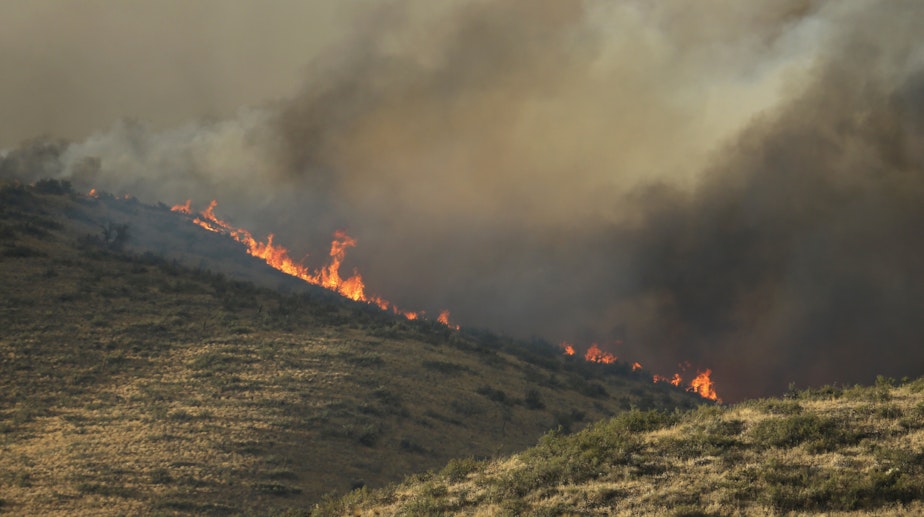Washington Under Siege By Fire: 'We Are Understaffed And Underequipped'

“Everything is tapped out.”
Those were the not-so-reassuring words of Peter Goldmark, Washington state lands commissioner. He spoke Thursday with KUOW’s Ross Reynolds, the day after three firefighters were killed in a wildfire near Twisp.
“We don’t have the full staffing that the commanders need to put the fire out as quickly as possible,” Goldmark said. “We are understaffed and underequipped.”
On Thursday, the state took the extraordinary step of accepting volunteers to fight the blazes. The Department of Natural Resources said it would open centers in Omak and Colville to interview volunteers and help them get into the wildfire battle.
"Even if a member of the public has sufficient credentials, deployment to a wildfire will depend on the availability of professional firefighter staff to accompany, direct, and ensure the safety of everyone concerned," the department said on its website, which gave directions on how to volunteer.
Sponsored
Crews have been fighting these wildfires across Washington state for weeks, but the blazes show little sign of slowing down. Fires have ravaged the rest of the West as well, burning a million acres down the coast.
Goldmark said this season is worse than last year. The fires are bigger and more spread out, encroaching on large and small communities – Chelan, Twisp, Spokane, Omak, Walla Walla.
National Guard personnel are on the lines after receiving training ahead of the fire season. But regular Army personnel also are training to join the fray, and foreign firefighters have flown in to help.
Most of the fires across the West have been triggered by lightning strikes that are hitting forests turned bone dry by years of drought.
Wildfire season in the West is also now a month longer now than it was 35 years ago, likely because of climate change, according to a recent study in Nature. The study, led by U.S. Forest Service ecologist Matt Jolly, examined the years 1979-2013. Jolly wrote that the fires have been spurred by a noxious cocktail of high temperatures, rain-free days and high winds.
Sponsored
Goldmark said there’s talk of preempting the fires, of getting people to clear away flammable brush “so that when the actual fire does arrive, it’s not as intense.”
Residents of Twisp have been through this before.
Jacqueline Koch, a spokeswoman for the Red Cross in Wenatchee, said it's operating eight shelters in cities around the fire zone. About 85 people stayed in them Wednesday night.
Koch also worked last year's fire season, which devastated some of these same communities.
“They went through this last year,” she said. “This was a really traumatic time for a lot of people. So, I think there’s a need to understand how difficult a time it is for the community.”
Sponsored
Some of the shelters are in the same places they were last year. “Even some of our volunteers who were impacted by wildfires last year in Winthrop, once again, are facing the same challenges this year. They’re staffing shelters and wondering if their own homes are safe.”
Koch said communication has been tough with the shelter near the Okanogan Complex fire near Twisp. But she recently spent a few days in the Chelan shelter, where many people have turned for help.
“When I went into the shelter what I saw is a number of kids playing basketball in the gym. And to me that really spoke volumes because the air quality is so horrible,” she said. “These kids are on summer vacation. There’s nowhere for them to go, and so they’d come into the shelter and they were playing.”


